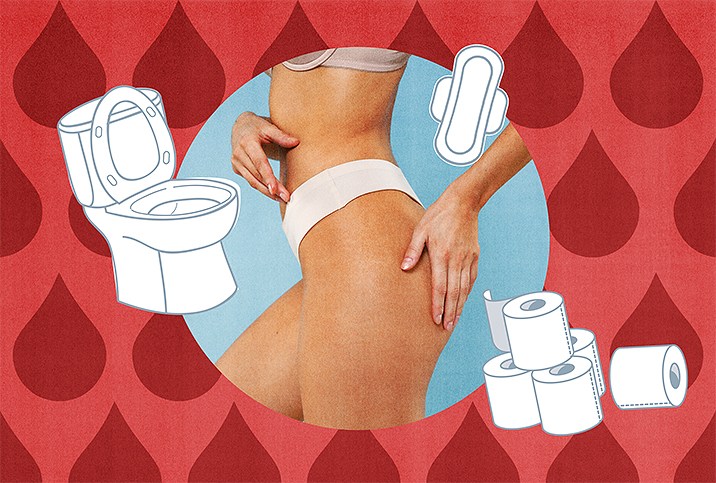Yes, Diarrhea Affects Your Sex Life

A case of diarrhea can be mortifying, particularly in the beginning of a new relationship, but amid the awkwardness lies an opportunity to grow closer with your partner.
Perhaps my article on constipation left you thinking, "Wait, what about the other one? You know...the opposite of constipation?" Turns out these two conditions—constipation and diarrhea—often go hand in hand, so to speak.
If you or someone you know has a chronic condition of the gastrointestinal (GI) tract, you undoubtedly know this truth on a much deeper, more personal level.
When it doesn't go away quickly
Diarrhea is characterized by passing watery poops with looser than usual feces three or more times a day. We're all likely to experience this condition. Acute diarrhea is a common problem, but not a big concern, and generally lasts for a day or so before going away on its own. If it occurs only after you eat specific foods, it might help to talk to a physician about food sensitivities—such as lactose or wheat—and to actively avoid foods with those ingredients.
However, when diarrhea persists beyond a few days and isn't connected to food, it can indicate a health issue, particularly if you experience it with other symptoms such as gut pain, bloody stool and weight loss. Long-term diarrhea can be a symptom of a more serious condition, such as inflammatory bowel disease (IBD), which includes Crohn's disease and ulcerative colitis. Diarrhea can also be a symptom of irritable bowel syndrome (IBS).
However, diagnoses don't often matter in the bedroom. If you have diarrhea, you have it. If it's chronic, it's more likely to impact your sex life. So how can you navigate sex and pleasure long term?
"People need to feel empowered enough to get help for pain with sex," said Tina Aswani Omprakash, a public health advocate and speaker.
Omprakash has used her own experience with Crohn's to found the award-winning blog "Own Your Crohn's" as well as the non-profit organization South Asian IBD Alliance/IBDesis. She started her blog to offer useful information, especially in regard to sex, to folks dealing with GI conditions.
"There are questions patients aren't asking and physicians aren't sharing," she said.
What causes diarrhea?
Diarrhea is the result of the body not absorbing enough water from the stool as it passes along the intestines toward the rectum, which is why the poops are so watery and why dehydration can be a serious complication. The first thing to do when you have diarrhea is to drink clean water.
According to the National Institutes of Health (NIH), common causes of diarrhea include:
- Bacteria or parasites from contaminated food or water
- Viruses, including the flu, norovirus and rotavirus
- Medicines such as antibiotics and cancer drugs
- Food intolerances and sensitivities, including lactose intolerance
Chronic diarrhea (loose stools lasting four or more weeks) may be an indication of a GI disease such as IBD or the disorder IBS.
Diarrhea and sex
Regardless of the cause, navigating a pressing urge to poop—frequently and unexpectedly—can be tricky, awkward or downright painful and embarrassing, especially when trying to have sex.
In 2018, Megan Nguyen, a registered nurse and doctoral candidate at the University of Toronto, co-authored a study on women's experiences of intimate relationships while living with IBS. She and colleagues found that dealing with socially taboo issues such as diarrhea in relationships challenges physical comfort and the ideas of what sex and pleasure "should" look like.
"It's difficult to navigate the demands of your body while also trying to live up to these standards of what you 'should' be like in an intimate relationship," Nguyen said.
Talking about conditions such as chronic diarrhea while educating folks on GI difficulties and intimacy can reduce harm, relieve tension and help get everyone on the same page, Omprakash said.
"It's very taboo and sensitive," she added. "We need to start talking about it."
Although IBD and IBS sound similar, inflammatory bowel disease leads to more immediate physical complications. It's an umbrella term for conditions that involve inflammation and/or ulcers in the digestive tract, such as Crohn's and ulcerative colitis.
Crohn's can impact every part of the digestive tract, from the esophagus to the rectum, whereas ulcerative colitis develops progressively in the rectum and large intestine over time. Severe diarrhea is characteristic of both conditions, and bloody diarrhea is especially common with ulcerative colitis. IBS can also bring diarrhea but is chiefly characterized by gut pain.
When medications don't help, IBD can lead to a host of complications, including intestinal blockage, abscesses and anal fistulas, which form as a result of significant inflammation that results in the lining of the intestine breaking through and creating a tunnel toward an opening in the skin around the anus, vagina and vulva, penis and/or the scrotum. These fistulas can form abscesses in the genitalia or anal region. You can imagine how awkward, painful and unsafe any attempt at pleasure in the same area can be, Omprakash said.
With ulcerated colitis, surgeons may opt to remove the large intestine and construct a "J-pouch," or a new pathway to eliminate waste through the bottom part of the small intestine. In the process of healing, having vaginal sex can sometimes prompt a strong urge to poop, Omprakash explained.
"I could feel the pressure up against that area, and you definitely have to make sure you heal before you have penetrative sex," she added. Anal intercourse is often not advised for patients living with a J-pouch and should be discussed with your primary doctor prior to engaging.
While J-pouches are a great treatment option for ulcerative colitis, they often become diseased if the diagnosis changes to Crohn’s disease postoperatively. Omprakash had to have her J-pouch removed after no medications worked for her Crohn’s and she was given an ostomy. The use of an ostomy bag, which is sometimes needed in Crohn’s disease, is when the bowel is brought to the surface of the abdomen (stoma) to release waste (into the ostomy bag).
“The ostomy has actually given me back quality of life from a sex point of view because I no longer am dealing with several fistulas or a diseased J-pouch,” Omprakash added.
For any GI surgery, recovery can complicate intimacy even further. For people with penises, erectile dysfunction and/or premature ejaculation is common after surgery. For people with vaginas, IBD surgery and recovery time—often six to eight weeks or longer—can require pelvic floor physical therapy.
It's difficult to navigate the demands of your body while also trying to live up to these standards of what you 'should' be like in an intimate relationship.
"You haven't had sex in a long time or you just had surgery and your entire pelvic floor feels battered," Omprakash said. "How do you start even having sex and what if there's a lot of pain? How do you get yourself help?"
Regardless of the condition, Omprakash said diarrhea's most basic problem is: "Oh, my God, I need to go run to the bathroom right now—and that can be right in the middle of sex."
This discomfort, and anticipation of discomfort, can have cascading effects on intimate relationships. Some of Nguyen's study participants, for example, talked about having self-esteem issues because their IBS made them "less than" other women who don't suffer from IBS. One of her patients reported hiding symptoms because she felt her bowel habits were disruptive to herself and her intimate relationship.
"Because there's such a taboo about GI disorders and diarrhea, she didn't feel comfortable ever telling her partners what her diagnosis was," Nguyen said. "She had to navigate the demands of having IBS and not being able to explain why she couldn't eat a particular thing. And because she wasn't open about that and didn't feel comfortable doing so, her partners would sometimes get frustrated with why she wouldn't be able to eat certain things."
Regardless of diagnosis, the taboo nature of GI issues and diarrhea affects intimacy with physical, emotional and social boundaries.
"Having IBS or other GI disorders can impact your intimate relationships because it demands a disclosure of your illness," Nguyen explained. "Doing so is very vulnerable, and it has implications for how you feel about yourself."
Communication is essential, but it's not all on you
Conditions that cause chronic diarrhea and other complications are, to say the least, not fun. But just as there are treatment options, there are ways of navigating relationships and sex—first and foremost, communicating.
"How are you supposed to have fulfilling, meaningful relationships unless you can feel comfortable in your own skin and be able to communicate about it?" Omprakash asked.
Depending on your level of comfort with your intimate partner, you can talk about symptoms or the need for recovery time, then share intimacy in ways that don't hurt or aren't dangerous. This conversation might sound like, "Let me recover from surgery, but let's do some foreplay."
In fact, Nguyen found GI difficulties can act as a force that brings partners closer. One woman she interviewed was very open about her IBS and how it has played a role in her relationship with her husband.
"Whereas IBS acted as a disruption for other participants, her IBS actually brought them closer together," she said.
For one particular surgery the woman underwent, her husband became closely involved in her physical care.
"We don't normally invite other people into the bathroom with us, but he was doing that with her," Nguyen said. "He was very supportive, acted like it was normal and brought an air of lightheartedness. He showed that he really cared about her and it wasn't a burden at all."
And it's true, the burden shouldn't all be on people with GI difficulties. Their partners can help bring support and intimacy in new ways, and physicians should also be more open to discussing sexual health with patients who have GI difficulties.
"There's just so much stigma that the doctor feels uncomfortable bringing it up, when they really could make the atmosphere comfortable enough to bring that up," Omprakash said.




















